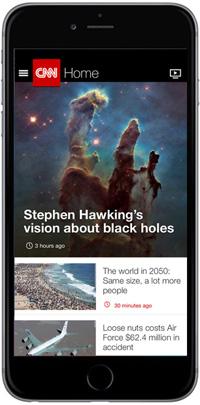 CNN is asking a federal appellate court to reject an iPhone user's bid to revive a lawsuit accusing the company of violating a video privacy law.
CNN is asking a federal appellate court to reject an iPhone user's bid to revive a lawsuit accusing the company of violating a video privacy law.
The broadcaster
contends it's entitled to dismissal of the lawsuit, brought by Illinois resident Ryan Perry, due to the recent Supreme Court decision in a matter involving Spokeo. The Supreme Court ruled in that
matter that consumers must show they were injured before they can sue in federal court.
Perry's lawsuit centers on allegations that CNN violated the Video Privacy Protection Act by allegedly
sending information about iPhone users' video-viewing history to the analytics company Bango. The Video Privacy Protection Act prohibits video rental companies from disclosing consumers' personally
identifiable information.
advertisement
advertisement
"Perry must suffer some concrete injury to bring suit," CNN argues in papers filed with the 11th Circuit Court of Appeals.
The company adds that Perry's
complaint "identifies no concrete injury that actually exists" or "any risk of harm that might occur because of CNN’s alleged disclosures."
CNN draws heavily on the Supreme Court's
recent decision in a lawsuit brought against Spokeo by Thomas Robins. He alleged that Spokeo violated the federal Fair Credit Reporting Act by displaying incorrect information about him. The Supreme
Court said that Robins could only proceed if he could prove that any errors resulted in a "concrete" injury.
That decision could affect a broad swath of cases against tech companies. Already,
companies including Google, Facebook and Yahoo have argued they're entitled to prevail in pending cases due to the ruling.
The battle between CNN and Perry dates to 2014, when he filed a
potential class-action lawsuit against the company. Perry, who said he downloaded CNN's app in 2013, alleged that the app sent Bango information about the clips that iPhone users watch, along with
their 12-digit Media Access Control addresses. (In 2014, Apple began restricting third parties from accessing MAC addresses as identifiers.)
U.S. District Court Judge Eleanor Ross in Atlanta
dismissed the case in April, ruing that MAC addresses aren't "personally identifiable."
She also ruled that Perry wasn't a "consumer" for purposes of the video privacy law.
That ruling
came several months after the 11th Circuit Court of Appeals said in a similar lawsuit that the Video Privacy Protection Act doesn't apply when people download a free app from the Cartoon Network.
Perry is now appealing that decision to the 11th Circuit. He is expected to file his arguments later this month.